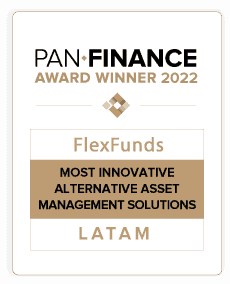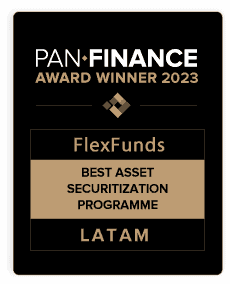- Here, we provide everything you need to know about SPVs, or special purpose vehicles, including their operation, benefits, and disadvantages.
- This information is essential for fund managers seeking to understand ways to develop investment strategies.
- At FlexFunds, we offer an asset securitization process created through an SPV to optimize strategy distribution. For more information, feel free to contact our specialists.
In the complex realm of finance, there are multiple ways to structure investment products according to the objectives and needs of the involved parties. One of the most popular is the creation of an SPV.
SPV stands for special purpose vehicle, also known as a special purpose entity.
Now then, what is an SPV? How is it constituted? Below, we reveal these and many other answers.
What is an SPV investment vehicle?
An SPV is simply an entity created by another, known as the sponsor, to carry out a specific “purpose” and endowed with a series of goods or assets.
Thus, its activity is specific and clearly defined: it is established with the aim of executing and exploiting a particular project. This is because it allows for the separation of the assets and risks inherent to the project through a series of contractual and/or corporate formulas.
Broadly speaking, an SPV is identified as a business investment vehicle or a vehicle company.
What is an investment vehicle?
It is important to remember that an investment vehicle is a method or structure used to make capital raising more efficient.
In this way, these entities serve as a mechanism to channel investments for a specific project, without their risks influencing the sponsor’s balance sheet (and vice versa).
Although they can have other functions, they are especially useful as a conduit to structure an asset securitization process, like the one carried out by FlexFunds.
They are also used by public institutions to provide certain services or execute a specific civil work.
How is an SPV constituted?
An SPV is constituted as a completely autonomous entity from a legal point of view. Consequently, its balance sheet does not have to be consolidated with that of the project promoter.
In addition to delimiting its activity, initially, the sponsor must endow it with foundational assets through the transfer of the necessary assets. For this, some type of contractual agreement is carried out. Generally, a trust is established.
In this way, the sponsor maintains certain economic interests in its favor and remains active in the project. However, it does not adopt the position of partner or administrator, remaining outside the risks and responsibilities.
Regarding its shareholding structure and its relationship with the sponsoring entity, it will be established according to the corporate and/or statutory agreements that are carried out.
Although an SPV adopts the figure of a legal person, the integration of human resources can be null. In fact, it is common for it to be constituted as an orphan company; with the promoter providing the know-how and a portfolio manager in charge of asset management.
The idea is to create an entity with patrimonial autonomy and a specific economic activity, but under the control of the sponsor. In this sense, the greater or lesser operating margin granted and the degree of control must be considered.
Although the statutes may establish that the vehicle company has a determined duration, it is usually linked to the existence of the assets.
In this way, an SPV is useful for complex and long-term financial operations. Moreover, the establishment of the domicile is a relevant aspect for tax and regulatory reasons.
Benefits of SPVs
SPVs have some noteworthy benefits:
- Limited liability: SPVs limit financial liability solely to the specific assets of the project and do not involve the shareholders’ assets.
- Tax optimization: In many cases, an SPV can be used to optimize the tax structure of a project or transaction due to its specific design.
- High flexibility: Another attractive point of an SPV is that it can be linked to complex projects, such as real estate or those involving the use of financial derivatives.
Disadvantages of SPVs
Unfortunately, SPVs are not perfect because they include some drawbacks:
- Administrative complexity: Unlike other investment vehicles, developing an SPV requires considering a complex legal and administrative process.
- Regulatory changes: Regulatory modifications by different governments could cause problems for companies that use these vehicles.
By constituting an SPV, the financial risk of the project is reduced to that of the asset portfolio itself.
Example: what does an SPV allow you to do?
Suppose a firm is interested in carrying out a real estate project. It has a portfolio of real estate assets but needs investors.
Due to the illiquid nature of real estate, it is difficult to establish relationships with investors. Additionally, the project’s risk is intertwined with its own activities, making external financing difficult.
The solution is to constitute an SPV and establish asset separation. In this way, the entity releases the project’s own risk on its balance sheet and gains the capacity to carry out a process that allows it to raise capital more easily and economically.
Furthermore, once the assets are isolated, the special purpose entity is in a position to use them as collateral to create and launch an efficient investment vehicle; becoming an issuer of listed products (ETP).
In this way, illiquid assets are transformed into securities with greater flexibility, the possibility of global reach, and ease of trading.
The constitution of an SPV has become one of the most used formulas to carry out the issuance of ETPs, contributing to the development of real estate investment funds, private equity funds, and hedge funds.
However, it is essential to precisely specify the corporate and contractual mechanisms for each specific case.
At FlexFunds, a specialist entity in designing and creating investment vehicles, we work with renowned international providers to offer customized solutions.
We offer you the possibility of issuing ETPs through an SPV constituted in Ireland and fully adapted to your needs. If you wish to learn more about our ETPs, do not hesitate to request a meeting with the FlexFunds team so we can address all your questions.
Sources:
- https://corporatefinanceinstitute.com/resources/management/special-purpose-vehicle-spv/







